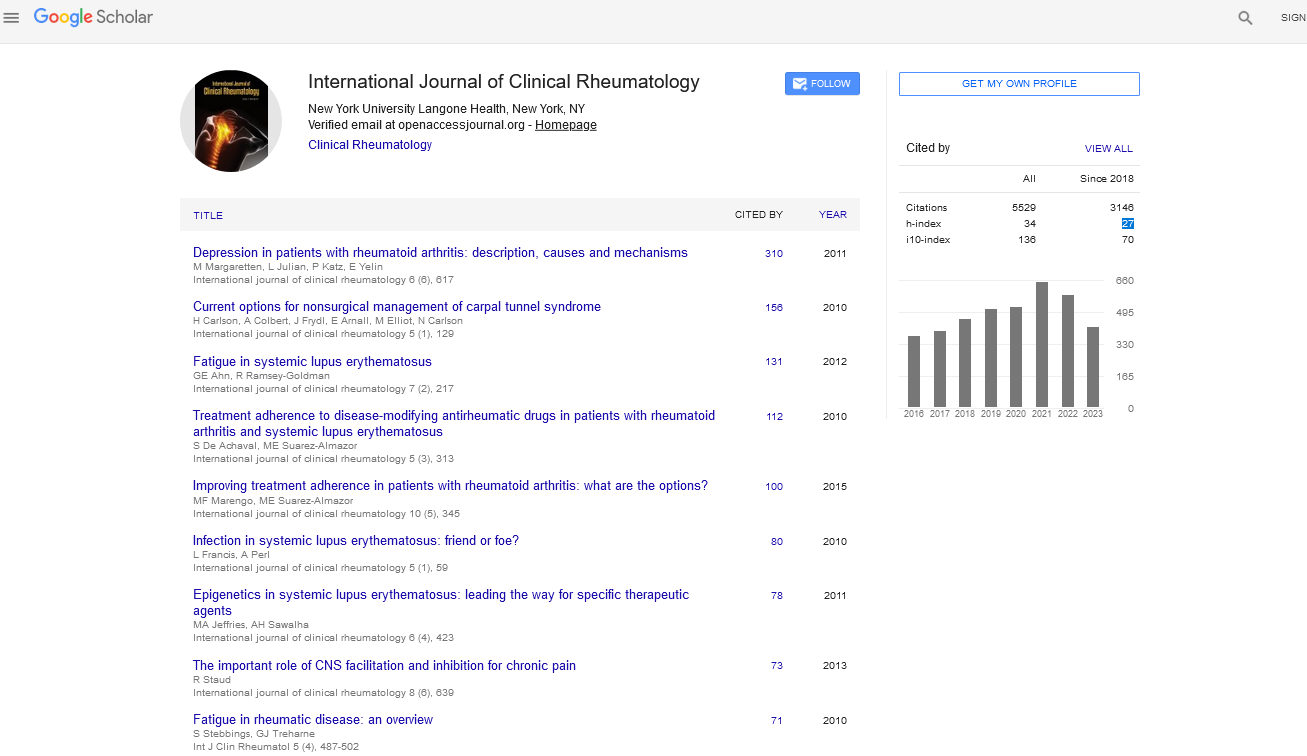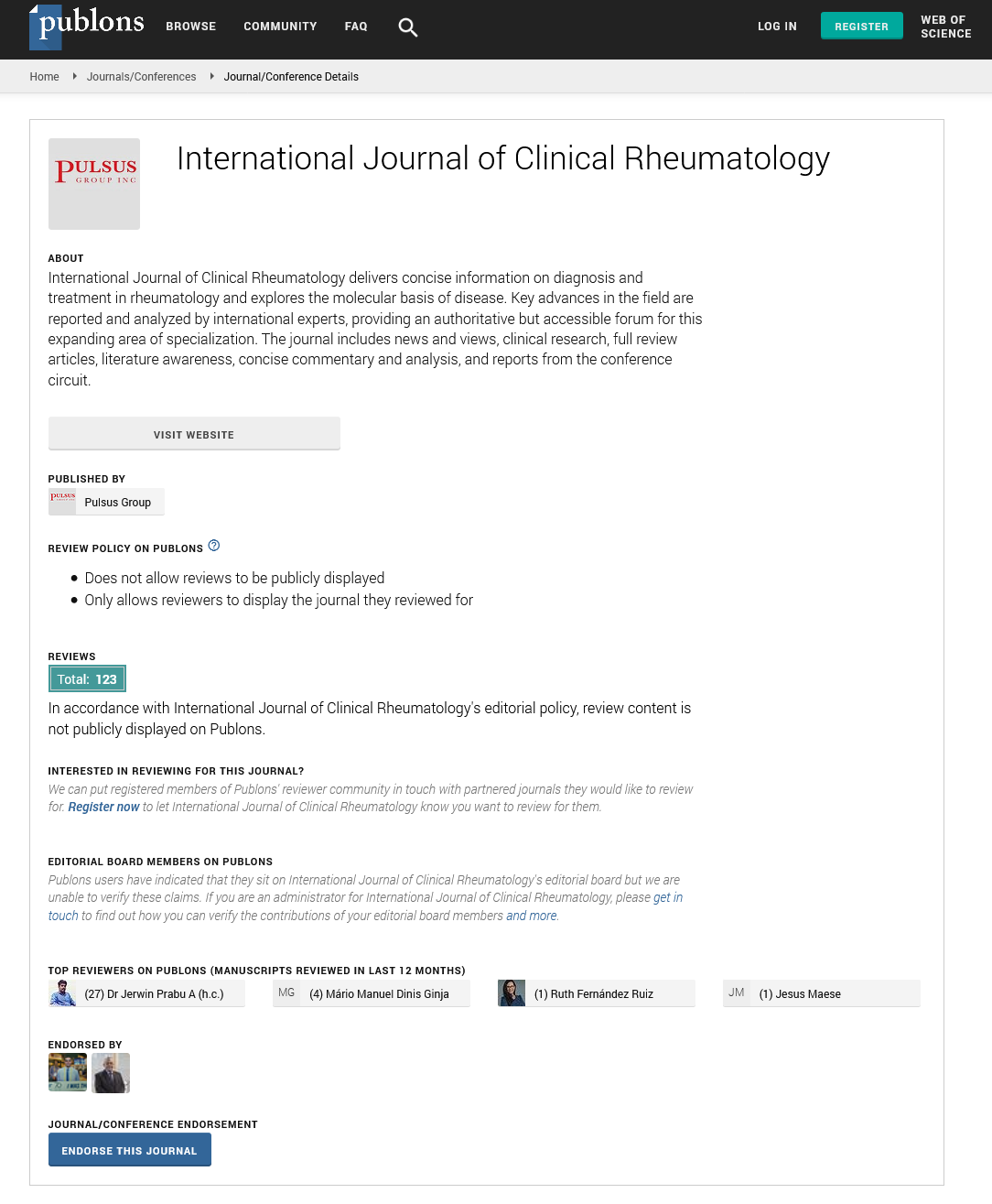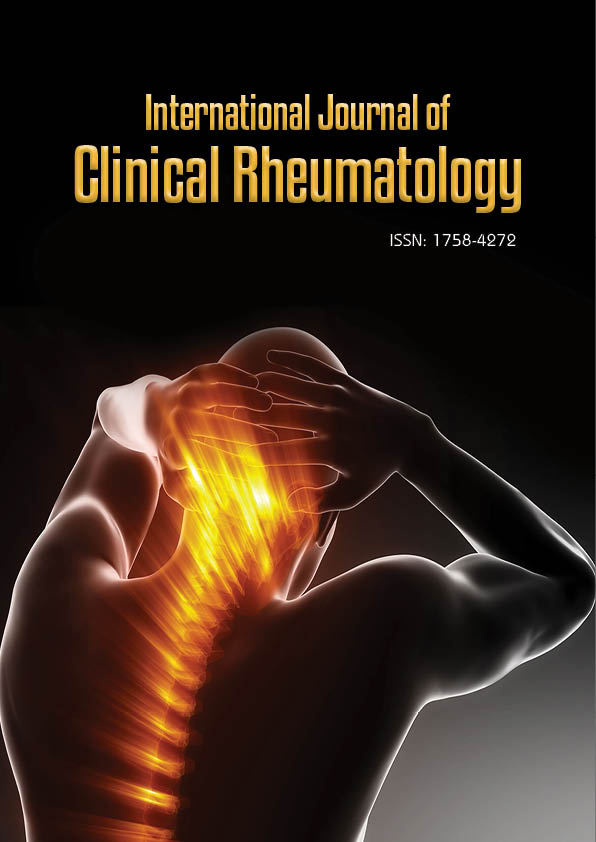Editorial - International Journal of Clinical Rheumatology (2023) Volume 18, Issue 8
Exchanging among rheumatologists' view of non-clinical custom and Bio-similar biologics
Ramchanra Yadav*
Department of Physics, Saveetha School of Engineering and Clinical Pharmacokinetic, Tamil Nadu, India
Department of Physics, Saveetha School of Engineering and Clinical Pharmacokinetic, Tamil Nadu, India
E-mail: ramchanra.yadav@gmail.com
Received: 02-Aug-2023, Manuscript No. fmijcr-23-114494; Editor assigned: 04- Aug-2023, Pre-QC No. fmijcr-23-114494 (PQ); Reviewed: 18-Aug-2023, QC No. fmijcr-23-114494; Revised: 22-Aug- 2023, Manuscript No. fmijcr-23-114494 (R); Published: 29-Aug-2023, DOI: 10.37532/1758-4272.2023.18(8).224-226
Abstract
Foundation The finish of this study was to assess rheumatologists' appreciations of biosimilar biologics and on-Clinical Exchanging (NMS). Methods A cross-sectional examination of the Saudi Society for Rheumatology's listed members was carried out. The focus of the survey was on NMS and biosimilars. Calculated retrogression was performed to learn the impact of socioeconomics and practice attributes on the utilization of biosimilars and NMS. Results Out of 249 SSR individuals, 143 finished the check, producing a reaction rate of57.4. Men made up 59.44 of those, with a mean age of 42.3 9.13 and practice times of 10.3 8.9, respectively. The maturity of responders was represented by rheumatologists handling adult cases (81.82) and Ministry of Health practitioners (43.36). 43 (30.07) actors reported having previously defined a biosimilar, with women having a higher probability (p = 0.015). NMS had been carried out on eligible cases by a total of 26 actors (or 18.18). Satisfactory information on biosimilars was accounted for by 69(48.25) entertainers. Independently, 88(61.5) and 69(48.3) reported the acceptability of substantiation to grant biosimilar approval for the studied suggestion and extrapolation to treat other conditions. By 37.1, the idea of summarizing the substantiation was well understood. 43 (30.07) actors had used biosimilars in their practice in the beginning. 26(18.18) actors tried NMS, and 86(60.1) actors thought NMS might hurt cases. Conclusion Among the adult and pediatric rheumatologists who participated in the study, there is a clear knowledge gap regarding the biosimilar blessing procedure. Additionally, a significant number of actors reported having negative thoughts regarding NMS.
Keywords
Biosimilars • Non-medical switching • Rheumatoid arthritis
Introduction
Saudi Arabia Introduction Rheumatic conditions are associated with a significant burden on cases and the community in Saudi Arabia. It is necessary to organize SSR-led educational conditioning and develop public guidelines regarding biosimilars and NMS. The long-term issues of rheumatic conditions have significantly improved thanks to biologics; in any case, this has accompanied an expansion in direct expenses for medical care frameworks. In many nations, improved access to biologic treatment and significant cost savings have resulted from the introduction of biosimilars into the clinical practice of rheumatology. Various circumstances of take-up with respect to biosimilars have been noticed around the world. This could be connected with productive tensions, variety of nonsupervisory techniques, and contrasts in methodologies on the most proficient method to bring biosimilars into wellbeing frameworks. The Middle East is affected by all of these factors; which has been demonstrated to have varying levels of acceptance of biosimilars and faces numerous challenges related to healthcare. Saudi Arabia's low levels of understanding and use of biosimilars must be addressed due to a lack of public guidelines. Rheumatologists are important stakeholders who help make it easier for people to use biosimilars. Acceptable communication with patients and caregivers, evaluation of the durability of medical care, and verification of the development of adverse events are the primary support tasks that must be completed when switching to a biosimilar treatment. Previous research conducted in other nations has revealed some businesses and issues related to the use of biosimilars, primarily as a result of a lack of comprehension of biosimilar manufacturing and blessing procedures. According to reports, the following are the main obstacles to full comprehension: 1) appreciation of the concept, summation of the substantiation; 2) in a model complaint, extrapolation to all approved suggestions based on successful clinical trials; and 3) short-term data on effectiveness and safety [1, 2].
Methodology
The CSG's May 2019 meeting marked the debut of this design, which would continue until November 2020. The CSG is a public master gathering of clinicians, clinical scholastics, multidisciplinary AHPs, medical caretakers, clinical therapists, and pharmacists. The CSG supports the creation and execution of a comprehensive portfolio of clinical studies and clinical trials in the field of pediatric rheumatology thanks to its strong consumer representation. Additional data on the design of the CSG, including content-explicit gatherings, the useful gathering, and the directing gathering are in the excursus (p 4). All individuals from the CSG (medical care experts and customers) shaped the plan guiding gathering, which was answerable for ID of closely involved individuals to be counseled while requesting investigation thoughts (board). The directing gathering likewise upheld with the most common way of gettogether investigation priority thoughts [3, 4]. The functional group, which included the CSG co-chairs, the CSG trainee representative, a clinical academic foundation trainee, the CSG director, and an outside expert in agreement decision wood and exploration precedence setting, was in charge of all design stages. The procedure for connecting and controlling the exploration precedence concepts is depicted in the figure. Cases with pediatric rheumatic complaints, their parents or other caregivers, and other individuals or groups affected by pediatric rheumatic conditions (e.g., siblings of cases, charities) provided the CSG consumer representatives with research ideas. Thoughts were gathered utilizing a web-based check appropriated to UK purchaser associations, social orders, and good cause (board). The CSG's customers wrote the test questions to ensure that they were fully comprehended using appropriate lay language (excursus, page 2). Inperson meetings, virtual meetings, or online checks were distributed to the professional groups outlined in the panel in a similar manner to gather ideas for exploration priorities [5, 6].
Discussion
This check is a crucial step that gives the SSR information that will help them design educational conditioning and spread objective information about biosimilars. We looked into ways to treat rheumatoid arthritis (RA) before biosimilars were approved in Saudi Arabia in 2015. Of the 54 entertainers in that review, 26.3 utilized biosimilars past to originators though in the ongoing review, we showed that around 60 of repliers demonstrated they're as of now prepared to begin utilizing biosimilars for treatment. During a 2018 indigenous meeting, we also conducted a study on Arab rheumatologists and found that only 30 of the participants indicated that they would also define a biosimilar for an eligible case [7, 8].
A lack of specifics and increased profitable pressure on the healthcare system are associated with the timing of this study, which occurred during the COVID- 19 epidemic. This could affected the reactions of entertainers. There's by and by an adding interest for biosimilars, particularly with the productive effect of Coronavirus that has impacted the clinical power chain across the world. This has prompted medication shortages, which thusly may direct the improvement of rules on the utilization of biosimilars and NMS.
Conclusion
In conclusion, this action has connected important knowledge gaps about the biosimilar approval process and other barriers that probably limit their use by Saudi Arabian rheumatologists. Negative perceptions of NMS were also linked, which should be the focus of early educational conditioning.
Conflicts of Interest
None
Acknowledgment
None
References
- Tonelli M, Wiebe N, Culleton B et al. Chronic kidney disease and mortality risk: a systematic review. Am Soc Nephrol.17,2034-47 (2006).
- Groothoff JW. Long-term outcomes of children with end-stage renal disease. Pediatric Nephrology. 20, 849-53 (2005).
- Qaseem A, Hopkins RH, Sweet DE et al. Screening, monitoring, and treatment of stage 1 to 3 chronic kidney disease: A clinical practice guideline from the American College of Physicians. Ann Intern Med. 159,835-47 (2013).
- Roncal Jimenez CA, Ishimoto T, Lanaspa MA et al. Fructokinase activity mediates dehydration-induced renal injury. Kidney Int. 86,294-302 (2014).
- Wesseling C, Crowe J, Hogstedt C et al. The epidemic of chronic kidney disease of unknown etiology in Mesoamerica: a call for interdisciplinary research and action. Am. J. Public Health. 103,1927-30 (2013).
- Chertow GM, Paltiel AD, Owen WF et al. Cost-effectiveness of cancer screening in end-stage renal disease. Ann Intern Med. 156, 1345-50 (1996).
- Pierratos A, McFarlane P, Chan CT. Quotidian dialysis--update 2005. Curr Opin Nephrol Hypertens. 14,119-24 (2005).
- Giri M. Choice of renal replacement therapy in patients with diabetic end stage renal disease. EDTNA ERCA J. 30,138-42 (2004).
- Passey C. Reducing the Dietary Acid Load: How a More Alkaline Diet Benefits Patients With Chronic Kidney Disease. J Ren Nutr. 27,151-160 (2017).
- Meldrum OW. Chotirmall SH .Mucus, Microbiomes and Pulmonary Disease. Biomedicines. 9,675 (2021).
Indexed at, Google Scholar, Crossref
Indexed at, Google Scholar, Crossref
Indexed at, Google Scholar, Crossref
Indexed at, Google Scholar, Crossref
Indexed at, Google Scholar, Crossref
Indexed at, Google Scholar, Crossref
Indexed at, Google Scholar, Crossref
Indexed at, Google Scholar, Crossref
Indexed at, Google Scholar, Crossref


